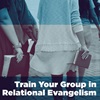One of the secrets of effective small group ministry is thinking in terms of developing a "one another" culture in your group rather than relying exclusively on a curriculum. Specifically, leaders should develop a small group agenda that incorporates all the "one another" values found in the New Testament. Curriculum is simply one tool that can be part of that group agenda.
Definition: One Anothers
The "one anothers" are commands found throughout the New Testament that describe how Christ-followers should relate to one another. A few of these commands include:
- "Encourage one another daily" (Hebrews 3:13).
- "Build each other up" (1 Thessalonians 5:11).
- "Spur one another on toward love and good deeds" (Hebrews 10:24).
- "Accept one another, then, just as Christ accepted you" (Romans 15:7).
- "Instruct one another" (Romans 15:14).
- "Admonish one another" (Colossians 3:16).
- "Serve one another in love" (Galatians 5:13).
- "Carry each other's burdens" (Galatians 6:2).
- "Be patient, bearing with one another in love" (Ephesians 4:2).
- "Do not slander one another" (James 4:11).
- "Don't grumble against each other" (James 5:9).
- "Forgive whatever grievances you may have against one another" (Colossians 3:13).
- "Confess your sins to each other" (James 5:16).
- "Pray for each other so that you may be healed" (James 5:16).
- "Love one another deeply, from the heart" (1 Peter 1:22).
If the primary focus of the small group is to "do" or complete the curriculum, with some "one another" values thrown in for good measure, then members will evaluate the group experience based on the primary focus, which is how well they understood or enjoyed the curriculum. The one anothers will be viewed as a good thing the group does, but if the focus is curriculum, then the group will not see the one anothers as the primary "thing" the group is about.
As a result, group members often struggle to connect in community with one another. This becomes even more evident when individual group members have widely varying spiritual maturity. Some people are feeling fed while others are not. When this happens, the problem likely stems from the fact the group is curriculum-focused rather than "one another" values-focused.
The basic small group agenda may vary depending on the focus of your small group ministry and the types of small groups you have, but remember that what happens both in and in-between small group gatherings will determine people's perception of small group life.
The challenge of the small group leader is to create the correct perception of Christian community from the beginning. Some curricula are better than others at providing components of a balanced agenda that includes the one anothers. But, the key is getting your small group agenda focused around all aspects of Christian community and not relying on a single curriculum to do that for you. With a good agenda, group members connect better, and those of varying spiritual maturity will each feel fed.
"One Another" Agendas
A key question is: How well does your agenda, along with your curriculum choices over time, reinforce and apply the "one another" commands found in the New Testament?
When planning your small group gatherings and your interaction with group members in-between group gatherings ask yourself the following questions:
- Is our group finding a good balance between learning, service, outreach, worship, fun, fellowship and rest?
- Are we finding healthy balances between life stories and Bible truth, between care and discipleship, between kindness and confrontation, and between openness and intimacy?
- Are we encouraging one another daily?
- Are we admonishing one another?
- Are we serving one another in love?
- Are we being patient, bearing with one another in love?
- Are we avoiding grumbling against each other outside group gatherings?
- Are we forgiving one another and confessing our sins to one another?
- Are we praying for one another daily?
Small groups have to be intentional about incorporating activities in group gatherings and in-between group gatherings that promote this type of community. A good curriculum can encourage and teach participants to be obedient to these commands, but if groups are just picking and choosing study guides without a plan, they will likely miss many opportunities to experience Christian community. However, if groups develop an agenda strategy that takes one-anothers into consideration, they will over time be more effective at incorporating all these principles into small group life.
Adapted from "Let's Get Started!" by Dan Lentz, Standard Publishing Small Group Help Guide









